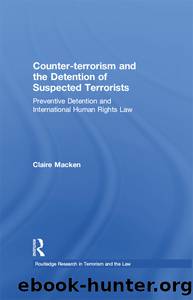Counter-Terrorism and the Detention of Suspected Terrorists by Macken Claire;

Author:Macken, Claire;
Language: eng
Format: epub
Publisher: Taylor & Francis Group
4 Legitimate and illegitimate purposes of
preventive detention
The purpose of this chapter is to consider whether preventive detention is a reasonably necessary measure and in particular, the least restrictive means to achieve a legitimate end. This is an application of the principle of proportionality as analysed in Chapter 2 and consists of two questions:
(1) First, the âspecific reason for interferenceâ1 â a determination as to whether preventive detention is legitimate, reasonable and necessary in all the circumstances;2 and
(2) Second, a determination as to whether preventive detention is reasonably necessary3 to achieve that purpose, having regard to any less intrusive measures that might otherwise fulfil that legitimate purpose.
In asking these questions, this chapter uses the definition of preventive detention in Chapter 1:
Preventive detention is an order permitting a person to be taken into custody, without criminal charge or trial, and deprived of their personal liberty [âdetentionâ] by executive order [âexecutive orderâ] for the purpose of preventing the detainee from committing an imminent terrorist act [âpreventive purposeâ].
As this chapter will show, whether preventive detention can serve a legitimate purpose is one of the most contentious issues in relation to State counter-terrorism policy. It has been said that âno other development â with the arguable exception of the (sometimes related) use of extreme interrogation techniques â has been as controversial or as difficult to reconcile with conventional legal practicesâ, than the practice of preventive detention.4
In part, the contention arises because preventive detention concerns the extent to which, if at all, a State faces a terrorist risk and whether that determination in itself is capable of being questioned. Preventive detention is also controversial because it gives rise to questions as to the adequacy of State criminal laws to proactively respond to terrorist risk, or whether a parallel non-criminal system of detention is a more appropriate counter-terrorism response. The controversy over preventive detention stems from the fact that it is intended to prevent future terrorist crime, and predictions are by their very nature, unreliable.
Given that a determination of terrorist risk is necessarily constrained by the amount of confidential or restricted material the government is willing to release in public, this chapter first provides an appropriate framework by which this assessment can be made. In applying this framework, including taking into account various claims that preventive detention could be used for an illegitimate purpose, this chapter provides a comment as to whether preventive detention is for a legitimate purpose, an application of the principle of proportionality in international human rights law.
Download
This site does not store any files on its server. We only index and link to content provided by other sites. Please contact the content providers to delete copyright contents if any and email us, we'll remove relevant links or contents immediately.
The Borden Murders by Sarah Miller(4021)
The Secret Barrister by The Secret Barrister(3425)
Coroner's Journal by Louis Cataldie(2361)
Police Exams Prep 2018-2019 by Kaplan Test Prep(2359)
The Splendid and the Vile by Erik Larson(2231)
Terrorist Cop by Mordecai Dzikansky & ROBERT SLATER(1965)
My Dark Places by James Ellroy(1806)
A Colony in a Nation by Chris Hayes(1797)
Black Klansman by Ron Stallworth(1705)
The Art of Flight by unknow(1697)
A Life of Crime by Harry Ognall(1596)
Objection! by Nancy Grace(1570)
The New Jim Crow by Michelle Alexander(1550)
Whoever Fights Monsters by Robert K. Ressler(1536)
Anatomy of Injustice by Raymond Bonner(1530)
Invisible Women by Caroline Criado Perez;(1521)
Obsession (The Volkov Mafia Series Book 1) by S.E Foster(1496)
American Prison by Shane Bauer(1481)
A is for Arsenic: The Poisons of Agatha Christie (Bloomsbury Sigma) by Kathryn Harkup(1457)
